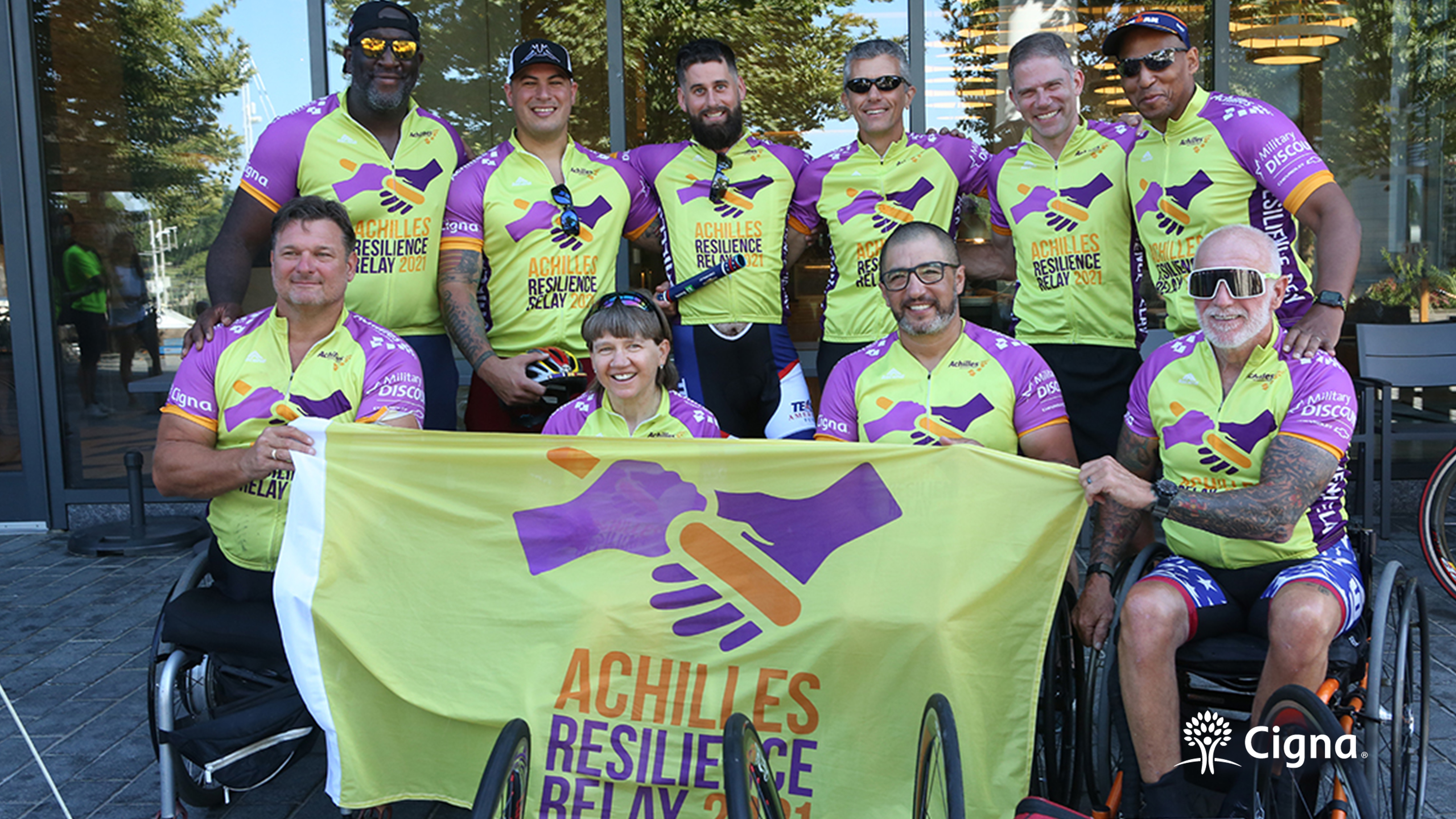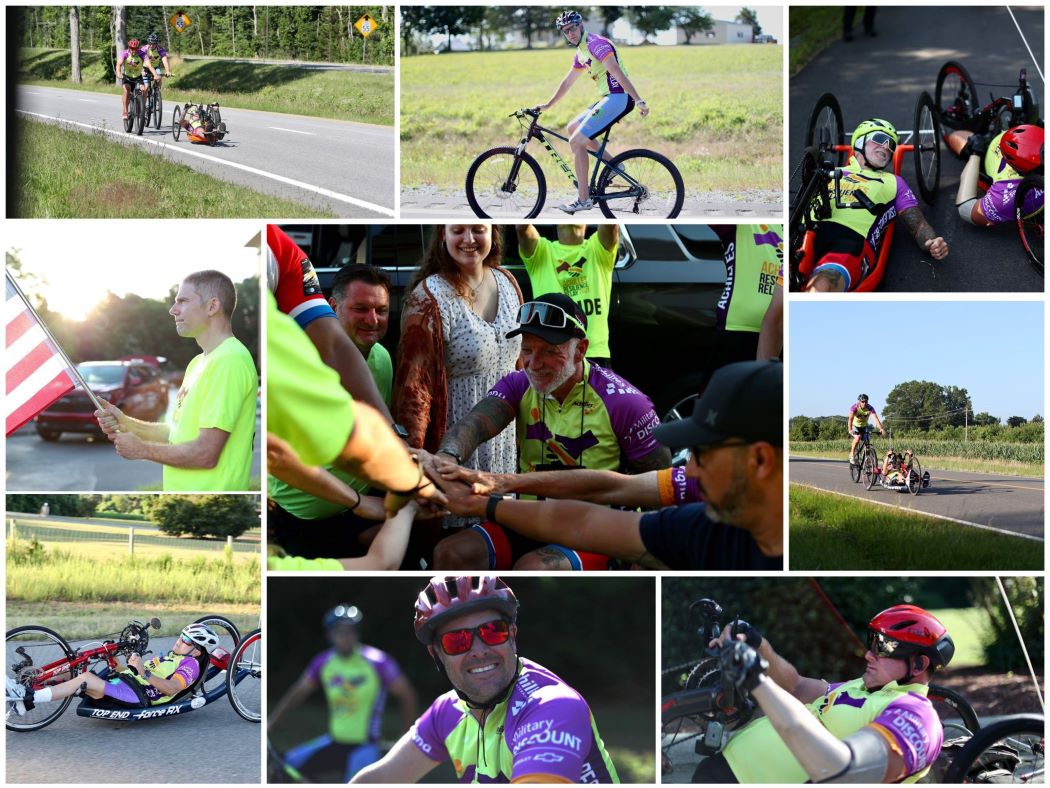
Resilience is defined as our ability as human beings to quickly recover from adversity. But sometimes, in the face of adversity, resilience can feel like it is easier said than done.
Case in point: Traumatized, disabled veterans, who are often left to deal with their physical condition in tandem with a set of psychological and emotional challenges. Enter Achilles International, a global organization operating in 25 countries including the United States, who is committed to bring hope, inspiration, and the joys of achievement to all by transforming the lives of people with disabilities through athletic programs and social connection.
According to the Cigna Resilience Index, people who have a strong sense of community and support from family, friends, teammates and peers often report higher levels of resilience. For active military members and veterans, that support system often includes fellow service men and women. For veterans who are members of the Achilles Freedom Team, this support system extends to teammates, doctors, community members, and in many instances, #TeamCigna guides.

#TeamCigna support guides helped the Achilles Freedom Team finish a 650-mile relay from Charlotte, North Carolina to New York City.
In this exclusive interview, Jonathan Prokup, deputy chief counsel for International Markets at Cigna, speaks to his involvement with Achilles International over the last eight years, deep diving into what it means to him personally, as well as why it’s an important program to all of us at Cigna. Prokup also discusses the importance of breaking down the stigma around mental health, particularly among the veteran community. Read on to learn more about this inspiring program.
How did you first get involved with Achilles?
Back in 2013, I used to run from our gym at Two Liberty Place. One day, I came back from a run and got stopped by Melissa Wilcox, who is the president of the Philadelphia Achilles Chapter. Melissa asked me if I had ever thought about running with athletes with disabilities. I didn’t even know that was a thing, so it was really just happenstance, because soon thereafter I became an Achilles guide. In 2018, I had the opportunity to join the Achilles board of directors, and then in the fall of 2020, I became the co-chair of the board with former governor David Patterson, who is my fellow co-chair.
There are many organizations that support people who live with disabilities. Why is Achilles the right fit for Cigna?
Companies like Cigna are unique in the health space in that we make money from people being healthy. If you think about every other stakeholder in the health services world: Hospitals, pharmacies, medical device companies, providers; they make money from people being sick, and curing or treating that illness.
 A lot of people think that health insurers make money from denying claims, but where we really have an impact is in helping people to not need services in the first place—because they don’t have those health conditions. So, getting in front of obesity, or diabetes, for example. At Cigna, we are creating a framework of well-being for our customers and creating an environment in which our customers can live healthy lives.
A lot of people think that health insurers make money from denying claims, but where we really have an impact is in helping people to not need services in the first place—because they don’t have those health conditions. So, getting in front of obesity, or diabetes, for example. At Cigna, we are creating a framework of well-being for our customers and creating an environment in which our customers can live healthy lives.
When we talk about inclusivity, Achilles is inclusivity personified. Achilles ensures that an athlete with a visual impairment, or with a prosthetic leg, can still participate in mainstream athletic events as any other person would. Achilles is trying to create an environment in which athletes can participate safely. That’s the affinity between Cigna and Achilles. It’s about creating that framework for people so that wherever they are on their health journey, they can live their healthiest and best lives.
What does the Achilles partnership mean to you personally?
As I mentioned, getting involved with Achilles was a bit more happenstance than anything. There are some people who get into causes because of a very personal experience. They have a family member who is experiencing mental distress, or they’ve lost a loved one to cancer, and they find their purpose. In my case I believe that not everyone finds meaning in life, some of us make meaning in life. Running with Achilles allowed me to combine something I loved doing already, with something that was infinitely more meaningful than just running by myself because I could actually live the ethos I would espouse about trying to create an environment that allowed people to live their best lives.
The athletes always look at the volunteers as the ones who are providing a service to others. I don’t think they realize how much they give back to us just by allowing us to be out there with them on the roads. It’s quite a special bond, and one that I’ve come to treasure.
Cigna talks a lot about whole person health. What is it and why is it important for veterans, specifically?
My father would sometimes tell me that life is sometimes about making chicken salad out of chicken feathers. It captures a very important concept that is at the forefront of our minds these days: Resilience. We all encounter adversity in our lives, and sometimes it’s a life-changing event like you or a loved one getting diagnosed with a life-threatening illness. And generally speaking, we can’t control the adversity. It’s often driven by external events. The only thing we can control is how we respond to that adversity.
Most of the Achilles Freedom Team athletes have experienced an injury, which is their form of adversity. There are some who have lost one or more limbs in service, and it is certainly helpful for a guide to accompany them in a race, and to create a safe space for them. But, we’re learning more and more about the psychological scars that veterans also endure as a result of their service. Maybe that’s in conjunction with a physical injury, or maybe it’s because of another traumatic experience.
Historically, there’s been a significant amount of stigma in discussing the psychological challenges that can result from those experiences. But as we break down that stigma, we recognize something really powerful: Discussing emotional and psychological pain, and being vulnerable to raise the issue when experiencing it, requires a very deep reserve of courage. It is so much more courageous to be able to confront that psychological pain out loud than to try to hold it in.
The more that we do to create a space for individuals to speak up about their psychological pain, the more they can develop the skills that are needed to respond in a resilient fashion. And that is part of what Achilles does, which is especially important for veterans, for whom there has historically been the extra stigma of feeling like it’s a weakness to share their pain.
When you see the more experienced athletes who have learned to adapt to their adversity and rise above it, you can see them bringing the younger athletes along to help them. They mentor them and show that that life doesn’t have to stop because of their injury. Instead, they teach them that it is possible to take the adversity that they’ve encountered in their lives and use it to create better versions of themselves. They teach them to make chicken salad out of chicken feathers.
We know that exercise has been tied to better physical and mental health. You yourself are a runner. If you had to give one piece of advice to someone who is not a runner on how to get started, what would it be?
I’m a runner by birth and by default, I suppose, but also by disposition. Running is my own form of a therapy session. There’s a great book out there called Running is my Therapy. That was the impetus for me to apply to the Eisenhower Fellowships, which I did back in 2019, for which I travelled to Australia and New Zealand. Over the course of five weeks, I studied how exercise can be a frontline treatment for mental health.
The question is, and let’s connect it back to the start of our conversation, “how do we create a framework for people in which they can use exercise to improve their mental well-being?” That’s where things get really hard. For me, I happen to have a very close, supportive family. I have a job that affords me the ability to take time to run. But, not everybody has that luxury. And running doesn’t necessarily resonate with everyone. For some people it’s going to be weightlifting, for some people it’s going to be walking, or swimming or gardening. I love running. I’m a runner through and through. But I do think that we do a disservice when we treat physical activity as a one-dimensional activity, like running. That’s not going to resonate with everyone.
One of the big takeaways from my fellowship was that we need to create the cultural relevance, the social relevance, clinical relevance, and the environmental relevance for people. We have to surround them with the right framework to help them access physical activity and exercise as a treatment regimen. Sometimes, just helping someone build the strength and stamina to move around their home can be a life-changing improvement.
We are currently working on building a training regimen for COVID-19 long haulers in collaboration with Achilles and a medical center in New York, to help people get into an exercise regimen. Our work will be around creating exercise regimens as well as resources like tips for people who would like to embrace exercise and physical activity as a form of well-being. From there, we’ll aim to make the regimens and resources available more broadly and to adapt them to different conditions and needs.
Check out the video below to learn more about how the Achilles program is helping veterans living with disabilities.